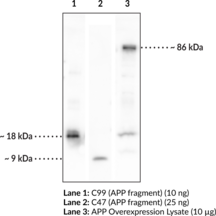Territorial Availability: Available through Bertin Technologies only in France
- Correlated keywords
- trans membrane patho genesis ?secretase ?secretase ?secretase C 99 amyloid? A? 40 42 intra neuronal Amyloid?A4 Pre A4 NexinII PNII ?-CTF
- Product Overview:
Amyloid precursor protein (APP) is a type I transmembrane protein that has a central role in the pathogenesis of Alzheimer’s disease, as well as additional roles in brain development, neuronal plasticity, and memory.{59228} APP is cleaved by ?-secretase (BACE) in neuronal endosomes during amyloidogenic processing of APP, generating the C-terminal C99 fragment, which is localized to the endoplasmic membrane.{59223,59224} C99 is further cleaved by ?-secretase, liberating the APP intracellular domain (AICD) and generating amyloid-? (A?) peptides of various lengths, including A?40 (Item No. 21617) and A?42 (Item No. 20574), which are hallmarks of Alzheimer’s disease. APP can also be cleaved by ?-secretase during non-amyloidogenic processing of APP, which occurs at the neuronal plasma membrane and generates the neuroprotective soluble APP fragment sAPP?, as well as a variety of other fragments, including the C47 fragment.{59228,59226} Transgenic mice expressing mutant forms of APP exhibit extracellular A? deposits in the brain, as well as cognitive dysfunction, and are widely used models of Alzheimer’s disease.{59227} Intraneuronal C99 levels are increased in the transgenic APPE693Q mouse model of Alzheimer’s disease, as well as postmortem frontal cortex from patients with sporadic Alzheimer’s disease.{59224,59225} Cayman’s APP (C99 Fragment) (C-Term) Polyclonal Antibody can be used for ELISA and Western blot (WB) applications. The antibody recognizes the C-terminal region corresponding to the C99 fragment to detect intact APP, as well as the C47 APP fragment, at 18 kDa and 9 kDa, respectively, from human samples.
Cayman Chemical’s mission is to help make research possible by supplying scientists worldwide with the basic research tools necessary for advancing human and animal health. Our utmost commitment to healthcare researchers is to offer the highest quality products with an affordable pricing policy.
Our scientists are experts in the synthesis, purification, and characterization of biochemicals ranging from small drug-like heterocycles to complex biolipids, fatty acids, and many others. We are also highly skilled in all aspects of assay and antibody development, protein expression, crystallization, and structure determination.
Over the past thirty years, Cayman developed a deep knowledge base in lipid biochemistry, including research involving the arachidonic acid cascade, inositol phosphates, and cannabinoids. This knowledge enabled the production of reagents of exceptional quality for cancer, oxidative injury, epigenetics, neuroscience, inflammation, metabolism, and many additional lines of research.
Our organic and analytical chemists specialize in the rapid development of manufacturing processes and analytical methods to carry out clinical and commercial GMP-API production. Pre-clinical drug discovery efforts are currently underway in the areas of bone restoration and repair, muscular dystrophy, oncology, and inflammation. A separate group of Ph.D.-level scientists are dedicated to offering Hit-to-Lead Discovery and Profiling Services for epigenetic targets. Our knowledgeable chemists can be contracted to perform complete sample analysis for analytes measured by the majority of our assays. We also offer a wide range of analytical services using LC-MS/MS, HPLC, GC, and many other techniques.
Accreditations
ISO/IEC 17025:2005
ISO Guide 34:2009
Cayman is a leader in the field of emerging drugs of abuse, providing high-purity Schedule I-V Controlled Substances to federally-licensed laboratories and qualified academic research institutions for forensic analyses. We are certified by ACLASS Accreditation Services with dual accreditation to ISO/IEC 17025:2005 and ISO Guide 34:2009.





